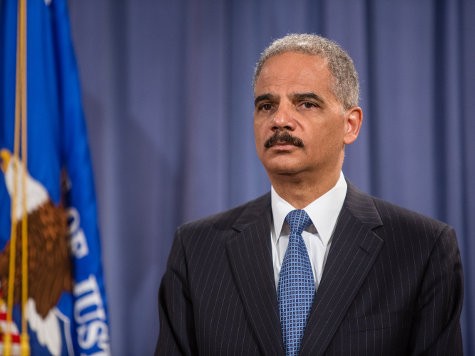
As the U.S. House of Representatives votes to find Attorney General Eric Holder in contempt of Congress, the natural question becomes: now what? Legal precedent lays out a step-by-step process, and Holder’s latest gambit suggests he knows of a loophole that could get his boss–President Barack Obama–past the next election before having to face the music.
Under federal law, the contempt citation is then sent to the U.S. Attorney for the District of Columbia, “whose duty it shall be to bring the matter before the grand jury for its action.” In other words, to seek a federal indictment to prosecute for a federal felony. But alas, the federal prosecutor receiving this referral is an appointee of Obama and serves under Holder at the Department of Justice (DOJ), so don’t expect him to try sending his boss to federal prison.
Once it becomes clear that DOJ is not going to prosecute the head of DOJ, the House can take this matter to court. A D.C. District federal trial court precedent from 2008 reaffirms that Congress can vindicate its right to information in court, and Congress also has the right to have its subpoenas enforced. A 1997 Supreme Court case, Raines v. Byrd, indicates such a suit can only be authorized by the House passing a resolution by majority vote, and naming a person (presumably Congressman Darrell Issa) to file suit in the U.S. District Court for the District of Columbia on behalf of the House.
However, here’s the catch. Courts are rightly reluctant to referee disputes between the two other coequal branches of government–the legislative and the executive. Unelected judges have a relatively narrow role in the democratic republic founded in our Constitution.
So among other things, in order for a case to be “justiciable”–that is, able to be decided by a court–the judge must conclude that Congress and the president are at an impasse. The political gears have seized up, and giving them more time does not have a reasonable likelihood that the White House and Capitol Hill will break the gridlock and reach a deal both sides will accept.
This is where Holder was very clever to say a couple days ago on camera that he is willing to negotiate. Even though it’s patently obvious that Holder is unwilling to fork over the potentially-incriminating documents on Operation Fast and Furious, and Issa will settle for nothing less, by claiming he’s willing to negotiate Holder might persuade a court to hold off another couple months after a lawsuit is filed before a court would be willing to allow a lawsuit to proceed. By the time anything happened, we’d be past Election Day.
If the federal judge assigned to this case understands that Holder’s offer is a sham and a cynical ploy, then we could have an initial ruling on Obama’s executive privilege claim before November. After a complaint is filed to start a lawsuit, the very next document filed is the defendant filing a motion to dismiss (if there’s any argument for dismissal). That’s when you claim executive privilege; you don’t need conferences with the court, discovery, or other negotiations. This all plays out in the initial pleadings. In something this big, the judge would probably hold a hearing to hash out arguments after both sides file their legal briefs, and then we’d have a decision. As I explain in my earlier pieces, there are two types of executive privilege, and the one Holder is asserting is the deliberative process privilege that tries to keep Obama out of the line of fire.
Whichever side loses, they’ll surely appeal to the U.S. Court of Appeals for the D.C. Circuit. There’s no chance that would happen by November. But this drama is about to go to the next level nonetheless.
As soon as the House votes Holder in contempt, Speaker John Boehner should request the U.S. attorney give him an immediate answer as to whether he’ll prosecute Holder (since we all know the answer already). The very same day he gets that “no” answer, he should have Issa introduce a resolution for authorization to file suit.
It’s time to get this process underway. A federal agent is dead. Guns went to drug cartels. DOJ made a false statement to Congress that DOJ didn’t know what happened. And the attorney general refuses to let us see how all this came about. This cavalier flaunting of the law cannot stand.
Breitbart News legal contributor Ken Klukowski is on faculty at Liberty University School of Law and the author of “Making Executive Privilege Work” by Cleveland State Law Review.

COMMENTS
Please let us know if you're having issues with commenting.